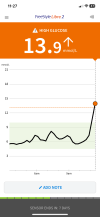@NewbieHelp , this is my view about having high rises in blood sugar after food. One should try and avoid those choppy up and down sugar levels, especially if you have issues with glucose metabolism / impaired glucose intolerance. This why I like the cgm devices, you can see those choppy graphs, as I call them. Unfortunately, you cannot see these so called 'spikes' or high rises with glucometers. Technology has moved on and we have cgm devices. I'm not advocating going out and buying cgms every two weeks when you have T2 as you are not trying to manage blood sugars through insulin therapy like a T1 must, but I suggest, once in a while, after reducing carbohydrate intake in each and every meal, you will reduce the likely hood of having high blood sugar levels in the interim between when you first test preprandial and when you test postprandial. Purchasing a cgm once in a while to see what's going on over a 24 hours period will help you.
Reducing carbohydrate in each meal you eat will decrease the likely hood of have those elevated blood sugars an hour after eating. Simply testing an hour after eating with a fingerprick would be very hit and miss. My own blood sugars will rise to peak, sometimes 90 minutes to 2 hours after, depending on the fat content.
To put simply, Avoiding high carb meals is key to a smoother graph profile. Of course, there will be a rise after eating a meal, but managing how high those rises go, is down to diet in most cases. That is why low and very low carbohydrate meals are so good at smoothing out those possible blood sugar peaks.
In a metabolically healthy individual the pancreas will deal efficiently and effectively with glucose levels. Of course, there will be a rise, but in non diabetics, blood sugars are swiftly dealt with.
Here is a quote from a research paper titled : Postprandial Glucose Spikes, an Important Contributor to Cardiovascular Disease in Diabetes?
" ...... epidemiological research now suggests that postprandial high glucose “spikes” as opposed to high average glucose levels are a more important determinant in CVD development in diabetes. Therefore, we argue that new glucose lowering strategies should be more directed against the reduction of postprandial spikes, than of HbA1c and/or average glucose, ..."
Significantly dropping carbohydrates in every meal you eat, and avoiding sugary drinks will give you confidence that when you test your blood preprandial and 2 hrs postprandial it would be very unlikely there would be a significant rise in blood sugars between those two test points when testing with a glucometer.
I hope that helps.
Clinical trials investigating whether glucose lowering treatment reduces the risk of CVD in diabetes have thus far yielded mixed results. However, this doesn't rule out the possibility of hyperglycemia playing a major causal role in promoting CVD or ...

pmc.ncbi.nlm.nih.gov

